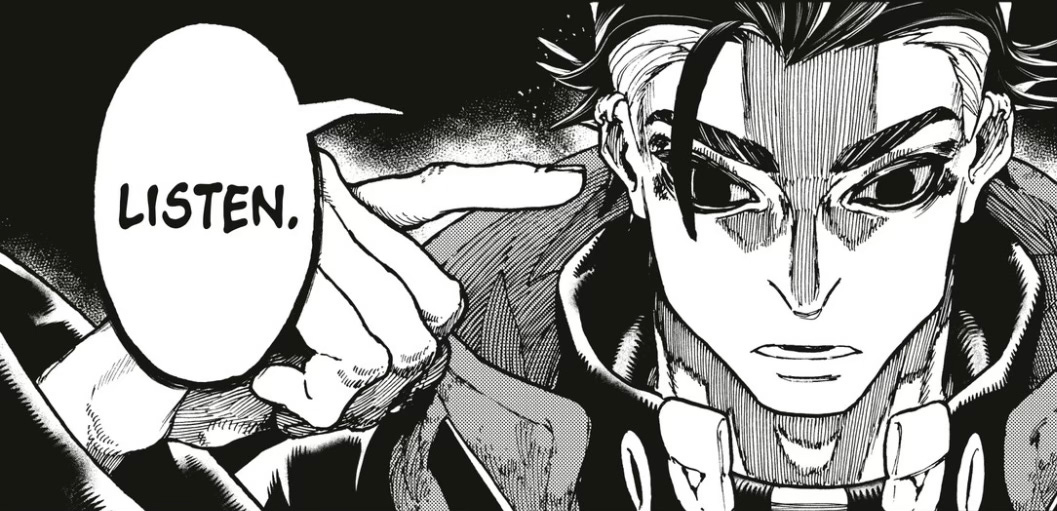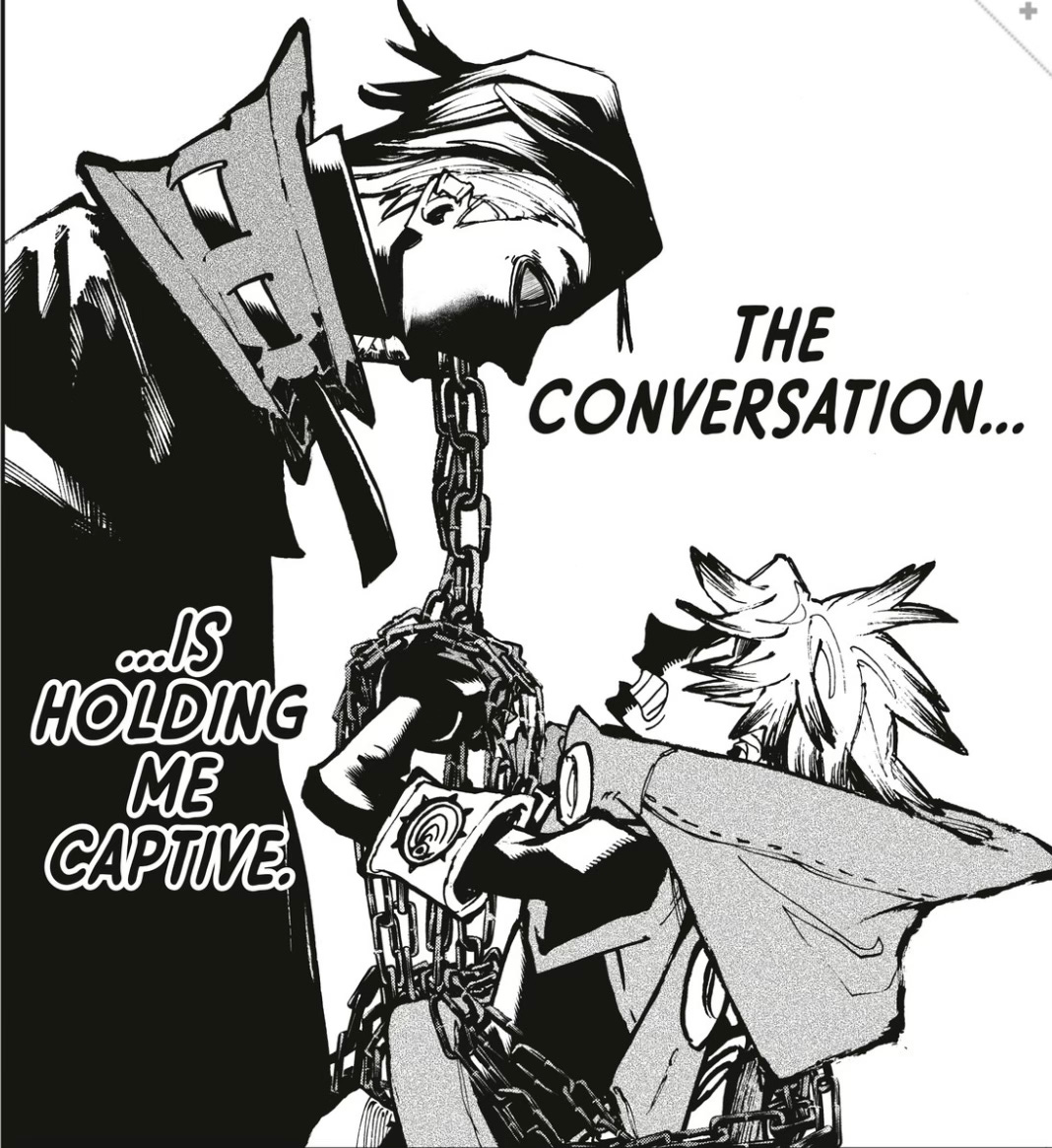Gachiakuta: The Crisis of Conscience
Being a good guy is nice and all, but what if being a good guy would be easier by being bad?
Preface!
I’ve spent the last few weeks rereading all of Wind Breaker, then Gachiakuta, and now Witch Hat Atelier, and I just have to say—what a collection. All three are so good and even better a second time.
Gachiakuta’s art is just gorgeous, and it’s only getting better, but it’s the complexities of the plot and the setting that are really proving to be exceptional. Every time something else is introduced, a compelling twist or a new magical element, I can’t help but admire not just how well it works on its own, but how well it fits with the story overall.
Also, the anime is coming out in July and it’s gonna be a banger. Prepare thyself.
Preface over.
I’m going to start with a story about Boromir. Apologies to my wife, who not-so-lovingly calls him Bored-omir. I was reading about JRR Tolkien and how early criticism of The Lord of the Rings was that it was too good vs evil. There wasn’t enough gray morality. To which Tolkien was all like, “uh, Gondor?”
And he’s spot on. Boromir himself is a walking source of grayness, but it all stems from one major crisis of conscience. He goes so far as to wrestle Frodo for the ring because his conscience is in such crisis. And that crisis had literally been going on since they left Rivendell. Talk about a long crisis. Anyway, that’s what makes him so compelling.
But a good crisis of conscience doesn’t always come at the right time, doesn’t always affect the plot the way it maybe should, doesn’t always deliver in the magnitude that it could/should.
Thankfully, Gachiakuta nails it in a big way.
Before we get into Gachiakuta, here’s what you need to know.
Rudo doesn’t have much. Just his pseudo-father Regto and a love of lost things—garbage, essentially. When he’s accused of killing Regto, he’s condemned to death. That death sentence being that he’s thrown out of the Sphere—where rich people live—into an empty void to who knows where.
Well, that ‘where’ is an actual place, with actual people, and a whole lot of garbage. Rudo is taken in by The Cleaners, a fun and expressive group of “good guys” who fight animate garbage and raiders. But Rudo is determined to get back to the Sphere.
And that’s all you need to know.
Gachiakuta has one of those plot lines that’s very simple, but no less compelling because of it. Rudo has fallen down from the Sphere and he wants to get back up there. Easy does it. The Cleaners are going to help him get back.
Without additional context, it’s quite straightforward, but then you get into the little variants that make it interesting. For instance, why does Rudo want to get back to the surface? What does he have to gain by going back there? As readers, we can say pretty conclusively—nothing. He has nothing to gain by going up there. Just more disappointment at not being accepted. Not knowing anyone. Now having anything. Yet he is so determined to vindicate himself up there, to find whoever really killed Regto.
That’s such an effective place to be as a plot because it allows maximum effectiveness when deploying a crisis of conscience, and Gachiakuta is the model for how this works.
In Volume 6, Rudo and the Cleaners have been taken by the Raiders and their leader Zodyl Typhon. All the Cleaners are swept away (pun intended), leaving Rudo to discuss things with Typhon. Again, without context, this is “new, potentially prodigal good guy faces big bad guy” moment. Simple. Nothing more needed.
But then you add in the context that makes this special. Typhon makes Rudo an offer—why go back to the Sphere when we could destroy it?
This offer hit me hard as a reader. Like a really strong jab-cross. The jab—what does Rudo have to gain by going back to the land of the rich when he himself is not rich. And the cross—why wouldn’t he want to wreak complete havoc on those awful rich people that ruined his life?
It’s one of those moments where you have to stop and pause as the reader because it’s actually quite a compelling offer, and if Rudo hadn’t been so angry about other happenings, I think he would have seriously considered this possibility. More on that later.
This is a major crisis of conscience that works even better because, as readers, we can see things in a much more level-headed and big-picture manner than Rudo can, him being all up in his emotions. I challenge you, the reader, to hear that offer and not consider that it would be a very valid way for Rudo to progress.
It’s rare to see a crisis of conscience hit this effectively. I think of two different crisis in mainstream storytelling. Harry Potter, when Harry is offered the chance to join Draco, and The Lord of the Rings, when Frodo reaches the fires of Mount Doom.
For Harry, the offer to join Draco is so early in the story that there’s no real reason for us to be that invested in the outcome, not least of all because there’s really nothing to gain by Harry throwing his lot in with the blond snot who insulted his best friend. A crisis of conscience? Not really. I doubt Harry even considered it.
Frodo’s crisis of conscience is much more substantial, because he does, in fact, fail the crisis, but it’s literally at the end of all things. So sure, it hits hard, but it also just doesn’t last long.
In Gachiakuta, this crisis of conscience comes at the perfect time, with the perfect context. We’ve just seen Rudo settling into the Cleaners, the “good guys,” if you will. He may be starting to see that life is better down here than anything he could hope to return to up there. But he still carries a rage towards the people who framed him for the death of his only family.
It also severely disrupts the good guy vs bad guy plot line. I mean, Raiders are always the bad guys. Always. And usually they just raid indiscriminately. That’s sort of their thing. But instead of continuing on that predictable and not altogether ineffective plot line, they throw this crisis in at a time when we’re just getting settled into the battle lines. I mean, just before this, we see this:
Very, very clear battle lines. Good guys vs bad guys. And again, that would have worked just fine. Gachiakuta thrives with its compelling characters, so if it was just Rudo and the Cleaners sweeping up (pun still intended), it would still be wildly compelling. Instead, this crisis presents a new option, a middle ground, though it sounds a tad crazy to even call it that, because that option is to destroy the Sphere, where all the rich people live.
Am I overplaying my hand by saying that I’m stilling thinking about Typhon’s offer to destroy the rich?
Seriously though, even taking out what the reader brings to the page, for Rudo, the character, it has to be somewhat appealing. That world cast him out. Tried to kill him. Killed his only family. Why not destroy them?
There is another story that does this quite well—Witch Hat Atelier. In Witch Hat Atelier, Coco accidentally casts a spell that turns her mom to stone. Unfortunately, only a forbidden spell can restore her to her human form. So when the option to learn forbidden magic is presented to Coco… well, of course she thinks about it.
A crisis of conscience is so difficult to execute because you need it to resonate with both the reader and the character. There has to be value provided to both. Rudo and the reader would both see value in this offer, and I do believe that Rudo’s struggle to act, or to fight against Typhon (as seen in the panel below) are a result of him seriously considering this offer, although perhaps just subconsciously as of yet.









What you wrote about a "crisis of conscience" really expresses well what first drew me to the series I'm currently writing and drawing: the realisation that there's a constant battle going on inside every human soul. In real life, it's not always easy to see the line between good and evil. Our conscience is a very precious gift that we ignore at our peril...
Another one that's been on my list for quite a while!